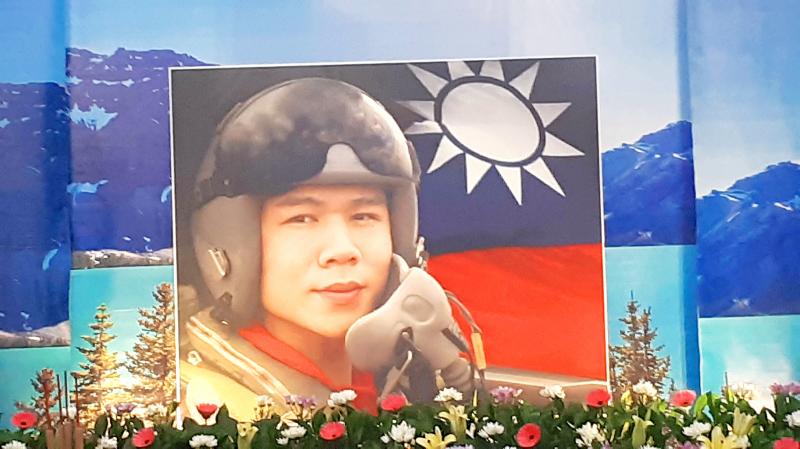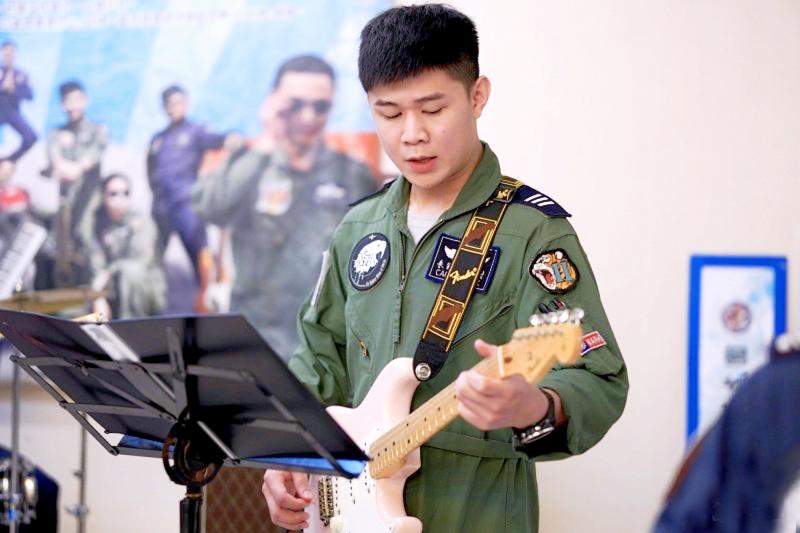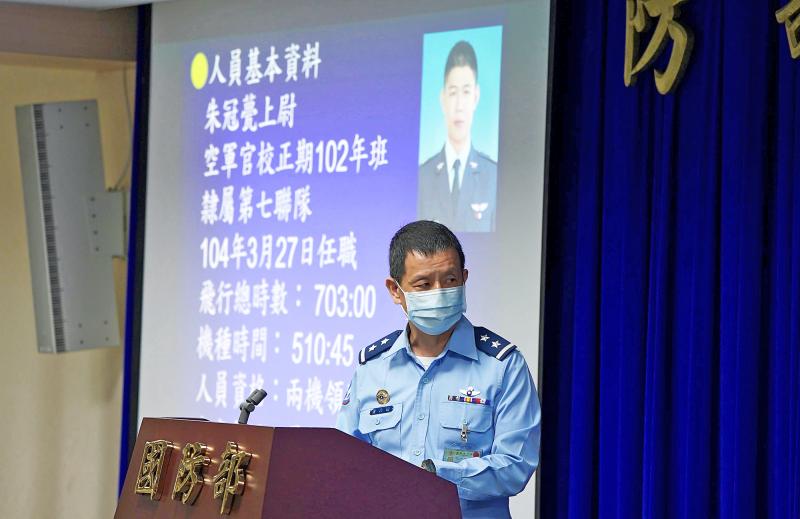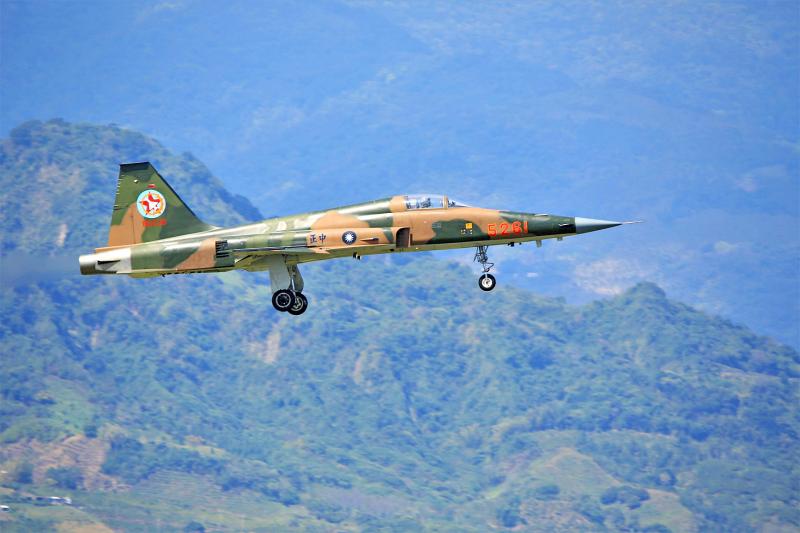Air force pilot Captain Chu Kuan-meng (朱冠甍) was killed yesterday after ejecting from his F-5E jet over the sea off Taitung County.
He was 29.
The jet from the 7th Tactical Flight Wing crashed into the water after Chu ejected. He was retrieved from the water and taken to Taitung Mackay Memorial Hospital, where he was declared dead.

Photo: Huang Ming-tang, Taipei Times
He is survived by a wife and a one-year-old daughter.
The Taitung County Fire Department said that it was informed of a suspected jet crash off the Jialulan (加路蘭) area in Taitung City and confirmed the incident with the Ministry of National Defense at 7:55am.
A medical helicopter dispatched by the National Airborne Service Corps found Chu at about 8:30am.

Photo: Tu Chu-min, Taipei Times
He was pronounced dead at 9:27am.
Preliminary findings released yesterday afternoon indicated that Chu sustained extracranial contusions and cranial hemorrhaging.
The main cause of death is likely to be the central nervous system going into shock, coroners said.

Photo: CNA
Whether he sustained the injuries while ejecting from the aircraft or in landing requires further investigation, they said.
President Tsai Ing-wen (蔡英文) expressed her condolences to the family via Facebook.
She wrote that she has asked the ministry to look into the cause of the crash and assist Chu’s family as needed.

Photo courtesy of Chiu Ming-yuan via CNA
At a news conference at 10:40am, Major General Huang Chih-wei (黃志偉) said that the ministry has suspended all training flights and ordered all of its F-5s grounded for inspection.
Chu had taken off from Chihhang Air Force Base at 7:29am, Huang said.
Shortly after takeoff he reported the failure of his right-side engine, he said.
Chu ejected at 7:31am, about 1 nautical mile (1.9km) north of the base, Huang said.
When asked whether Chu’s actions were to keep the jet away from residential areas, Huang said that standard procedure in such situations is to keep the plane airborne and try to return to base, only ejecting if that is not possible.
It should be instinctive for pilots to do all they can to keep a doomed plane from crashing into a populated area, he said.
However, an investigation is ongoing and a definitive answer cannot be provided at this time, he said.
The ministry wrote on Twitter: “The mission of guarding our airspace is tough, but our airmen stand ready even at this moment of grief.”
Chinese Nationalist Party (KMT) Chairman Johnny Chiang (江啟臣) wrote on Facebook that the party supports the ministry at this difficult time, but urged it to clarify the cause of the incident.
A decision in 2016 to replace F-5s with newer models has since been disrupted by the Tsai administration’s promotion of the indigenous fighter program, Chiang wrote.
Tsai must tell the public whether the indigenous fighter program would lead to an extension of the service life of the F-5s — which have been in service in Taiwan for more than 40 years — to avoid a gap in serviceable planes until manufacturing begins, he wrote.
The issue of aging equipment should not be brought to the fore by an accident, as happened in the tank crash in Kinmen County’s Lieyu Township (烈嶼) last month, Chiang said.
He called on the ministry to reconsider its funding allocations.
Aerospace Industrial Development Corp (漢翔航空工業) collaborated with US-based aerospace and defense firm Northrop to produce F-5 E/Fs in Taiwan from 1974.
Taiwan manufactured the aircraft independently, at one point having the largest F-5 fleet in the world until it ended its production line.
Chu was a guitarist for a band and loved fishing, the military said.
He was in line for a promotion to major in January, it said.
Additional reporting by CNA

The US government has signed defense cooperation agreements with Japan and the Philippines to boost the deterrence capabilities of countries in the first island chain, a report by the National Security Bureau (NSB) showed. The main countries on the first island chain include the two nations and Taiwan. The bureau is to present the report at a meeting of the legislature’s Foreign Affairs and National Defense Committee tomorrow. The US military has deployed Typhon missile systems to Japan’s Yamaguchi Prefecture and Zambales province in the Philippines during their joint military exercises. It has also installed NMESIS anti-ship systems in Japan’s Okinawa

TRAGEDY STRIKES TAIPEI: The suspect died after falling off a building after he threw smoke grenades into Taipei Main Station and went on a killing spree in Zhongshan A 27-year-old suspect allegedly threw smoke grenades in Taipei Main Station and then proceeded to Zhongshan MRT Station in a random killing spree that resulted in the death of the suspect and two other civilians, and seven injured, including one in critical condition, as of press time last night. The suspect, identified as a man surnamed Chang Wen (張文), allegedly began the attack at Taipei Main Station, the Taipei Fire Department said, adding that it received a report at 5:24pm that smoke grenades had been thrown in the station. One man in his 50s was rushed to hospital after a cardiac arrest

‘WIN-WIN’: The Philippines, and central and eastern European countries are important potential drone cooperation partners, Minister of Foreign Affairs Lin Chia-lung said Minister of Foreign Affairs Lin Chia-lung (林佳龍) in an interview published yesterday confirmed that there are joint ventures between Taiwan and Poland in the drone industry. Lin made the remark in an exclusive interview with the Chinese-language Liberty Times (the Taipei Times’ sister paper). The government-backed Taiwan Excellence Drone International Business Opportunities Alliance and the Polish Chamber of Unmanned Systems on Wednesday last week signed a memorandum of understanding in Poland to develop a “non-China” supply chain for drones and work together on key technologies. Asked if Taiwan prioritized Poland among central and eastern European countries in drone collaboration, Lin

ON ALERT: Taiwan’s partners would issue warnings if China attempted to use Interpol to target Taiwanese, and the global body has mechanisms to prevent it, an official said China has stationed two to four people specializing in Taiwan affairs at its embassies in several democratic countries to monitor and harass Taiwanese, actions that the host nations would not tolerate, National Security Bureau (NSB) Director-General Tsai Ming-yen (蔡明彥) said yesterday. Tsai made the comments at a meeting of the legislature’s Foreign Affairs and National Defense Committee, which asked him and Minister of National Defense Wellington Koo (顧立雄) to report on potential conflicts in the Taiwan Strait and military preparedness. Democratic Progressive Party (DPP) Legislator Michelle Lin (林楚茵) expressed concern that Beijing has posted personnel from China’s Taiwan Affairs Office to its